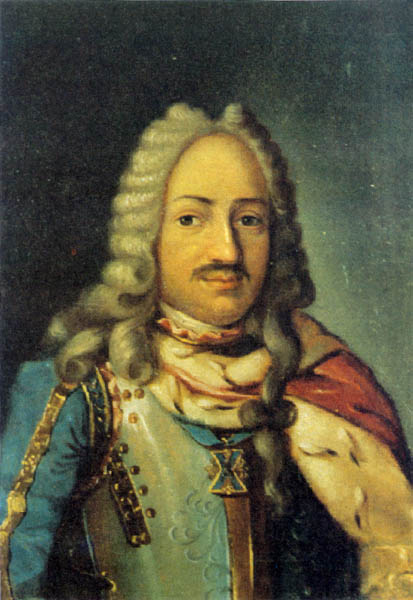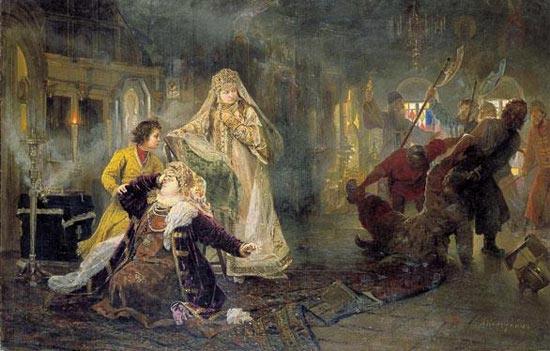The Young Czar
 |
| Francois Lefort |
In 1697 the
courts of Europe were astounded by the arrival of a young man travelling
incognito; armed with the highest of credentials, the youthful Peter Mikhailov[i] met with kings and
shipwrights, princes and carpenters.
He was Czar Pyotr Alexeyevich, now sole ruler of the Russian
empire[ii]. The seven foot giant
arrived in the Netherlands, ready to proffer his support to William III against the encroachment of Louis XIV’s France. Peter and his military
advisers were alarmed by the possibility of renewed attacks from the Ottoman
Empire. His solution was to persuade the rulers of Western Europe to join with
Russia in repelling the invaders.
Peter’s
fascination with Western Europe had been fostered by the Swiss captain of his
personal guard; François Jacobiwitz leFort. LeFort had begun his military
career in the Netherlands and had served in a disastrous campaign against the
Tartars in Crimea.
Childhood
 |
| Czar Alexis |
Peter was
born on 9th June 1672, the son of Czar Alexis, by his second wife Natalya Naryshkina. Peter was the fourth of Alexis’ children; he had two
older brothers and an older sister[iii].
At the age
of two Peter had a staff of fourteen and a grand apartment in the Kremlin. The
royal children had dwarf servants trained to act as servants and playmates.
From an early age Peter’s favourite toys were ones with a military flavour.
‘Toy soldiers and forts,
model pikes, swords, arquebuses and pistols spread across his tables and chairs
and floor. Next to his bed, Peter kept his most precious toy, given to him by
Matveyev…………a model of a boat.’[iv]
Peter was
often taken out by his father, who doted on this youngest of his children. An
ambassador form Austria caught sight of the young Czarevitch;
‘The door opened suddenly
and Peter, three years old, a curly headed boy, was seen for a moment holding
his mother’s hand.’[v].
Peter was
only three years old when his father died on 29th January 1676. His
half-brothers and sister were protected by their mother Maria Miloslavskaya’s powerful family. Peter’s mother was from a less
well-connected clan.
Death of a Half Brother
Czar Feodor III
Peter’s
elder brother, the fifteen year old Feodor III was his father’s successor. Feodor,
although disabled from birth, was an accomplished scholar. His short rule
showed every indication of bringing enlightenment to what was still a medieval
country. Feodor founded an academy of science, reduced the severity of penal
laws and introduced a liberalism into Russian affairs.
During his
reign Feodor’s nineteen year old sister Sophia attended sessions of the boyar[vi] council and was consulted
by her uncle Ivan Miloslavsky[vii] and Prince Vasily Galitzyne. When Feodor died on 7th
May 1682, leaving no children, Sophia, who had stayed at her brother’s bedside
throughout his last illness, demanded that her brother Ivan be given the
imperial throne instead of the ten year old Peter, who had been elected by
acclamation of the people. His mother Natalya had been made Regent during
Peter’s minority.
‘This election is unjust.
Peter is young and impetuous. Ivan has reached his majority. He must be the tsar.’[viii]
When this
demand was refused Sophia then suggested that both brothers share the throne,
but the Patriarch, who had overseen Peter’s election, refused her request
‘No, joint rule is ruinous.
Let there be one tsar. It is thus pleasing to God.’[ix]
At the
funeral Sophia made a public display of her all too real grief[x]. Intensely annoyed by this
unmaidenly behaviour Tsarina Natasha removed her son part way through the
lengthy service.
The Streltsy Revolt
Feodor’s
death and the dispute about which brother was to rule was only one of the
inspirations behind the Moscow Uprising[xi]. The Moscow based Streltsy Regiments[xii] revolted; partly because
of an outstanding grievance of the Griboyedov Regiment, whose colonel Semyon
Griboyedov was withholding half their pay and had forced them to work on Easter
week[xiii]. The Griboyedov
Regiment were joined by a further seventeen regiments.
Natalya’s
fledgling government was supported by the old families, but none of them were
capable of dealing with the uprising of the Streltsy regiments. Rumours were
spread through the regiments to the effect that Feodor had been poisoned with
the connivance of the new Czar’s family and the boyars. Orthodoxy and the old
ways would be degraded; foreigners would rule and the Streltsy would be
punished.
Certainly at
least one member of the Miloslavsky family was involved in spreading the
rumours, Ivan, who was keen to throw out the Naryshkins who had taken over the
levers of power formerly under the control of the Miloslavsky’s. Another party
to the plot was Prince Galitzyne[xiv]. The plotters needed a
member of the royal family to rule through and they found her in Czarevna
Sophia.
On 15th
May 1682 the revolt burst into flames; two members of Sophia’s intimate circle
galloped into the Streltsy quarter of Moscow crying
‘’The Naryshkins have
murdered the Tsarevich Ivan! To the Kremlin! The Naryshkins will kill the whole
Royal Family. To arms! Punish the traitors!’[xv]
The Streltsy
erupted and converged upon a Kremlin, where the gates were wide open as the
Regent and her advisers had no reason to believe that trouble was brewing. The
Streltsy swept into the Kremlin and the regiment on guard abandoned their posts
to join their colleagues.
Natalya displays Ivan to the Streltsy
Natalya and
her son and stepson showed themselves to the soldiers from the top of the Red
Staricase; she then departed and her senior adviser, Artamon Matveyev[xvi] spoke to the soldiers, further
calming them. He was followed by the Patriarch and then the son of the Streltsy
commander attempted to impose military discipline. The Streltsy soldiers
re-erupted, charged up the staircase and threw the man onto the pikes of
soldiers down in the courtyard.
This act of
violence incited further violence and the soldiers ripped Matveyev from the
protecting arms of the Czarina. He too was thrown down and ripped to pieces in
front of the Regent and her children. The Streltsy now ran riot and surged
through the Kremlin seeking victims, while Natalya, Ivan and Peter huddled in
the Banqueting Hall.
The
Streltsy, balked of the majority of their Naryshkin victims ran riot in the
Kremlin for a second day. On the third
day they returned and threatened to kill every boyar in the palace and
intimated that the Regent and the remainder of the royal family were also in
danger.
The Streltsy drag Peter's uncle to his death
Devoid of
any other choice Natalya was forced to give up her brother to the mob of
soldiers to save her son and stepson. Ivan was given the last rites in the
palace chapel. Ivan Naryshkin was tortured to death but failed to admit that he
had poisoned Czar Feodor.
Finally the
Streltsy blood lust was appeased and most of the remainder of the Naryshkin
family escaped death. Natalya’s father was forced to become a monk at a
monastery 400 miles from Moscow. The Streltsy demanded back pay[xvii], an amnesty and a
triumphal column to be erected in Red Square to honour their valiant deeds. A
cowed government gave in to their demands. The musketeers were now to be
renamed the Palace Guard.
The Joint Czardom
.jpg) |
| Natalya Naryshkina |
On 23rd
May, prompted by Sophia’s agents, the Streltsy demanded that Ivan be made
co-monarch with Peter; after all he was the eldest living son of Czar Alexis’
first wife, while Peter was the child of the second wife. If their demands were
not met the Streltsy threatened to attack the Kremlin again. As the older boy
Ivan was to be the senior Czar.
Unable to
control the Streltsy the government had no choice. The disabled Ivan[xviii] was reluctant to rule,
but was persuaded by Sophia to agree to attend state occasions and sometimes
attend council. And Sophia’s final throw of the dice was the demand on 29th
May, by the Streltsy, that the Regent should be Czarevna Sophia. The same day a
decree announced the change of Regent. The two boys were enthroned on June 6th.
The Streltsy
Uprising was to mark Peter for life; he hated the Kremlin and Moscow from now
on; he hated the Orthodox Church and he hated that he and his mother had been
left unprotected when the Streltsy revolted.
Peter was to
spend the next few years of his life in the countryside outside Moscow. His
arrival at the pinnacle of power in Russia would eventually see Moscow stripped
of its role as the powerhouse of the country, with the creation of St
Petersburg.
Bibliography
Natasha’s
Dance – Orlando Figes, Penguin Books Ltd 2002
Russia and
the Russians – Geoffrey Hosking, The Penguin Press 2001
William and
Mary – John van der Kiste, Sutton Publishing 2003
Peter the
Great – Robert K Massie, Abacus 1992
William and
Mary – Henri & Barbara van der Zee, History Book Club 1973
www.wikipedia.en
[i]
25 at this time
[iii]
All children of Alexis’ first wife
[iv]
Peter the Great - Massie
[v]
Ibid
[vi]
Senior Russian nobles
[vii]
Her father died in 1668
[viii]
Peter the Great - Massie
[ix]
Ibid
[x]
Hitherto female members of the Czar’s family were screened from the public by a
moving canopy and were veiled. Sophia had dispensed with much of her veiling
[xi]
Or Streltsy Uprising.
[xii]
Pikemen and musketeers who guarded the Kremlin, acted as police or firemen as
necessary; for many of them it became an inherited privilege. As members of the
army were not taxed many opened businesses and forced the soldiers were used as
unpaid labour. Corruption was rife and officers were known to withhold their
soldier’s pay.
[xiii]
One of the holiest holidays of the Orthodox calendar.
[xiv]
His proposals for army reform during Feodor’s reign had earnt him the enmity of
the Boyars and thus he opposed Regent Natalya’s reign because they supported
it.
[xv]
Peter the Great - Massie
[xvi]
A former and popular commander of the Streltsy under Peter’s father
[xvii]
The property of the deceased had to be auctioned off to pay the monies owing,
along with the melting down of the silver in the Kremlin and a general tax on
the population
[xviii]
He had sight and speech problems


No comments:
Post a Comment
Note: only a member of this blog may post a comment.